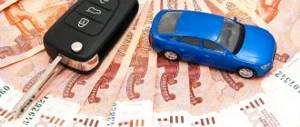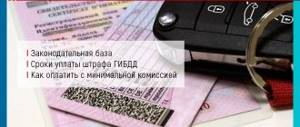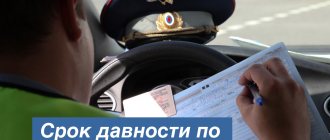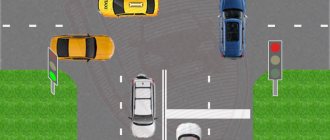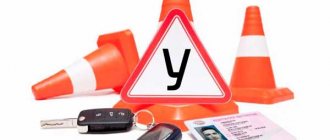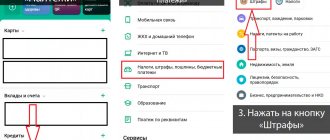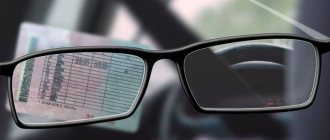What is the deadline for paying a fine of 30,000 rubles?
The imposed administrative fine of 30,000 rubles must be paid no later than 60 days from the date of entry into force of the court decision. The resolution comes into force 10 days from the date of its adoption.
If the order is not served due to the absence of the addressee at the place of residence, then it is considered served from the moment the postman’s notification is returned to the court. The time limit is not affected by the fact that the decision was served. But failure to receive a resolution may serve as a valid reason for requesting a deferment or installment plan.
The fine for deprivation of rights of 30,000 rubles is not subject to “lenient” conditions with a 50% discount. Therefore, if you think that you can pay a fine for deprivation of rights at a discount in the first 20 days or even immediately after issuance, you are deeply mistaken. The amount must be paid in full, otherwise the collection will not be considered repaid.
Payment of a fine for deprivation of rights due to alcohol intoxication
Debt payment methods:
- Through a bank branch or terminal, using a UIN receipt. The police, drawing up a report and submitting it to the judicial authorities, issues a receipt that has a bar code and a unique identifier number. With the help of these devices, the debtor can track payments made. The receipt is used repeatedly until all payments have been made.
- Through online banking. Having a UIN is required.
- Payment is made at the bailiff service. This method is used in case of delay or installment payment.
What happens if you don't pay the fine on time?
For defaulters who are late in paying the fine imposed upon deprivation of rights, the punishment is more than severe.
If within 60 days from the date of entry into force of the resolution the amount of funds does not go to the budget, then after about 5-10 days the documents will be transferred to the FSPP for forced collection and application of other sanctions. The bailiffs will “spin” the proceedings in 10 days, and now a number of even more serious problems are hanging over the debtor.
Additionally, in case of prolonged failure to pay an administrative fine, the defaulter faces:
- Collection of an enforcement fee from him in the amount of at least 1,000 rubles;
- Imposition of an administrative penalty under Art. 20.25 of the Code of Administrative Offenses of the Russian Federation for failure to pay a fine on time, which is either double the fine or 15 days of arrest at the discretion of the judge, taking into account the opinion of the defaulter. However, this does not exempt you from paying a fine of 30,000 rubles!
- Optionally under Art. 20.25 of the Code of Administrative Offenses of the Russian Federation, compulsory labor for up to 50 hours may be imposed instead of arrest or a double fine.
- Restriction of travel abroad, which will not have the most pleasant effect on your planned and already prepaid vacation.
- It is impossible to get a driver's license back if the period of deprivation has expired, but the fine has not yet been canceled.
Note: Often those who fail to pay fines end up in real bondage. First, they were given a fine of 30,000 rubles. Then the fine doubles to 60,000 rubles. And then, if 60,000 rubles are not repaid, the defaulter is again charged at 20.25 and another double fine is imposed. So, in six months, the amount of debt to the state can increase from 30 to 200 thousand rubles.
The police, however, do not shy away from setting up drivers to get a fine:
Common Myths
An insufficiently high level of legal literacy, the formalism of court workers and the low qualifications of various novice car lawyers have led to the birth of many myths about how not to pay a fine of 30,000 rubles or what the consequences of this are.
We will try to destroy the most popular of them in order to help drivers who violate traffic rules avoid even more unpleasant sanctions.
You don’t have to pay a fine for drunkenness, the bailiffs will issue an arrest and that’s it!
Complete nonsense. Firstly, bailiffs do not issue an arrest - this is the competence of the court. Secondly, being charged under 20.25 of the Code of Administrative Offenses of the Russian Federation for non-payment of a fine does not relieve one from the obligation to cover this same fine, and at the same time a new one - it can also be imposed.
In addition, the arrest is not given at the request of the defaulter (although this is also taken into account), but taking into account the circumstances of his case.
If a fine of 30,000 rubles is not paid on time, arrest is imposed:
- Persons who do not have a regular income and are unable to cover a repeated fine;
- Persons without permanent residence;
- In exceptional cases, taking into account the position of the defaulter.
However, arrest will not be granted if the person who has not paid the fine has health problems that preclude serving the fine. Also, arrest for failure to pay a fine of 30 thousand rubles is not imposed on pregnant women and minors.
You don’t have to pay a fine of 30,000 rubles, but after two years the statute of limitations will expire
Yes, there really is a deadline for collecting a fine - it is 2 years. Two years have passed and recovery is impossible.
But for these 2 years, the debtor’s life will turn into hell, because in addition to the sanctions under Art. 20.25 of the Code of Administrative Offenses of the Russian Federation (which also need to be paid, served time or worked!), bailiffs can seize accounts, a car, other property and put it up for auction.
In the conditions of modern Russia, it is impossible to get lost for 2 years with an unpaid fine just to avoid paying it.
You can pay 30,000 in installments, even if the term has expired
Possibly before the maturity date. Then, in any case, the bailiffs will open a case for non-payment of the fine (yes, yes, again 20.25 of the Code of Administrative Offenses of the Russian Federation) and impose a double fine of the unpaid amount.
IMPORTANT : Do not forget about the human factor - every 5th fine is “lost” in the web of the banking system, and the payer has to prove his case with receipts and running around the authorities. And multiple transfers in parts do not guarantee that they will reach the recipient.
Is it possible to return your license after deprivation without paying a fine of 30,000 rubles?
No you can not. The administrative regulations for issuing driver's licenses after deprivation of rights, as well as the provisions of the administrative code regarding the execution of penalties in the form of a fine, prohibit the return of a license to a driver who has not paid the fine.
Auto photo: Ärzte Zeitung
You can take an exam on your knowledge of traffic rules, collect all the papers, but if the fine of 30,000 is not paid, you cannot return your license until it is paid in full. Judicial practice in this area is clear: there are no cases of forcing the traffic police to issue a license if the driver has not paid 30,000 rubles.
Preventive measure for driving while intoxicated
Driving while intoxicated is absolutely unacceptable by law . If this rule is violated by law, a preventive measure is imposed in the form of deprivation of rights for a period of one and a half to two years and an administrative fine in the amount of 30,000 rubles (see Article 12.8 of the Code of Administrative Offenses of the Russian Federation).
Responsibility for driving a vehicle while intoxicated arises if it is established that substances that cause alcohol intoxication have been used in a concentration of ethyl alcohol of 0.16 mg per 1 liter of exhaled air. As legal practice shows in relation to Article 12.8 of the Code of Administrative Offenses of the Russian Federation, in most cases, court decisions are not made in favor of the offender.
Punishment for driving while intoxicated
In a situation where a motorist was stopped by traffic police while intoxicated, it is extremely difficult to escape punishment, since the law provides for an examination to confirm the fact of intoxication, if the police officers have grounds for this.
Authorized traffic police officers take a sample of exhaled air using a specialized device (breathalyzer), and this sample is analyzed. All events are carried out in the presence of witnesses and with mandatory video recording (see Part 2 of Article 25.7 of the Administrative Code). In addition, police may refer the driver for additional medical examination in the following situations :
- if the driver doubts the quality of the breathalyzer;
- if the offender does not agree with the results of the on-site analysis;
- if the motorist refused the examination at the stop;
- the device showed a negative blood alcohol reading, but there are reasons to consider the driver drunk (inappropriate behavior, the driver is unsteady on his feet, slurred speech, a clear smell of alcohol from the driver).
Important! If the test result is positive for the presence of alcohol in the blood of a motorist, inspectors are required to draw up a protocol on the offense in accordance with Article 12.8 of the Code of Administrative Offenses of the Russian Federation. After which this protocol is sent to the court for further consideration.
If there is no money to pay the fine, what should you do?
Are you given a fine of 30,000 rubles, but you don’t have the money to pay it? This will not save you from having to contribute your hard-earned funds to the state. But you can ask the court for a deferment or installment plan for the execution of the penalty in the form of a fine.
The financial situation of many drivers does not allow them to easily and without damage to the budget pay the thirty thousand fine imposed upon deprivation of their license. But hiding from recovery and waiting for new sanctions is not an option. The possibility of deferment or installment payment of the fine, regulated by Art. 31.5 Code of Administrative Offenses of the Russian Federation.
Deferment of a fine is a shift in the deadline for payment of a fine by the requested period of time or by a court decision. In practice, the duration of the deferment hardly exceeds 60 days, which, in addition to the two months already available by law, helps many drivers avoid unnecessary sanctions and overpayments.
Installment payment of a fine is a schedule established by the court for repaying a fine of 30,000 rubles in installments. Approximate or clear repayment dates are set by the court at its discretion, but taking into account the position of the person fined. The maximum duration of the installment plan usually does not exceed 90 days, but in the most exceptional cases the court may (but is not obliged!) agree to a meeting and establish a longer payment period.
Is it possible to pay only half of the fine for deprivation of rights?
The law does not provide for a reduction in penalties for driving a vehicle while drunk.
But according to Part 2.2 of Art. 4.1 of the Administrative Code, in the event of exceptional circumstances in which a violation is committed, the court may impose a monetary penalty less than the fine established by law. For example, a drunk driver delivered a person injured in an accident to a hospital department. Such issues are resolved in court on an individual basis.
This provision of the law does not remove the punishment, but makes it possible to reduce it if the perpetrator was guided by exceptional motives.
Is it possible and how can I get a deferment or installment plan for a fine of 30,000 rubles?
Yes, you can. A person who has been brought or has already been brought to administrative responsibility has two options for obtaining a deferment or installment plan for the fine:
- In court when making an administrative decision . If you admit guilt or understand that punishment cannot be avoided, apply for an installment plan or deferment of the fine. The judge will most likely grant it if you have extenuating circumstances and they deserve leniency.
- After the resolution comes into force . If you understand that you cannot pay the fine within the legal 60 days, contact the same court with a request for a deferment or installment plan. If it is refused, the court verdict can be appealed to the district court. Also, an application can be submitted after the expiration of the 60-day period prescribed by law.
They don’t just give a deferment or installment plan for a fine. You need good reasons for not paying the thirty thousand fine on time, and the person held accountable will have to prove them.
In each case, the evidence is individual. Below are examples of typical circumstances:
- Having other fines, debts or loans. Confirmed by relevant certificates and other documents. In this case, the court will pay attention to the real need for these loans. If, for example, after the ruling was made, an expensive phone was purchased on credit, the court is unlikely to consider this a reasonable basis.
- The presence of dependents, the need for additional funds for them. Is your child or wife on maternity leave sick? Provide medical documents, family composition certificates and information about current expenses.
- Unforeseen and difficult life circumstances: job loss, serious illness, accident. All this needs to be documented.
- Lack of a permanent source of income. A certificate from your last place of work, a copy of your employment record, or information from the employment center about your registration are suitable as evidence.
- A difficult financial situation caused both by specific circumstances and by a generally low level of income.
IMPORTANT : Remember that installment or deferment is not the obligation of the court, but only the right to help the offender pay the fine. If you have 10 loans for meaningless purposes, then the court is unlikely to take your side and give you additional time to pay the fine.
Is it possible to pay a fine for deprivation of rights in installments?
If the fine is a large amount, the law provides for the following benefits:
- a deferment of 30 days may be granted;
- Payment of the fine may be spread over 3 months.
Such benefits are allowed by the court based on a petition from the violator. The application indicates the applicant’s personal data and his contacts. Then the request and reasons why a deferment on payments is needed is stated.
The following documents are attached to the application:
- duplicate work book;
- certificate from the employment center;
- if you have a job, a certificate of income;
- other documents confirming the difficult financial situation of the perpetrator.
The decision is made within 3 days. The presence of the applicant at the trial is not required. In this case, a request for consideration of the case without the fate of the perpetrator is attached to the application.
Note!
After the time allotted for the installment plan has expired, the countdown of 60 days begins to pay the debt in full.
Application for deferment or installment payment of a fine
An application to defer the execution of a fine or to provide an installment plan for its payment is drawn up in free form to the court that issued the decision. It must indicate:
- Name of the court where the document is filed;
- Your full name, residence and registration address;
- Circumstances of the case: when the decision to impose a fine was made, what was the deadline for its payment;
- Objective reasons why the fine cannot be paid on time;
- Links to evidence;
- A request for deferment or installment plan indicating the date or schedule for repayment of the debt;
- Personal signature and date of signing the application.
The document must be accompanied by all documents confirming that you are not paying a fine of 30,000 rubles for valid reasons. Such a petition is not subject to duty and is considered no later than 10 days from the date of its receipt by the court.
What to do if the fine of 30,000 is overdue?
The expiration of the period does not prevent the involved person from exercising his right to receive an installment plan or deferment. If a case under Article 20.25 of the Code of Administrative Offenses of the Russian Federation has already been initiated, there is a chance to justify yourself a little before the court by providing a full set of evidence that the reasons for non-payment of a large fine are valid.
The same reasons as for obtaining an installment plan or deferment will be used as evidence.
IMPORTANT : The court will not close the proceedings in the case of non-payment of a fine of 30,000 rubles, but will be able to impose a minimum punishment - for example, a couple of days of arrest or several hours of compulsory labor. In any case, the initial fine will need to be paid and the sooner the better.
Exception : If the decision to impose a fine is not received by the violator for reasons beyond his control - business trip, illness, military service. In this case, there is a chance not to be held accountable with the provision of further installment plans or deferment on a separate appeal.
Is it possible to pay half the amount?
If the defendant does not have the opportunity to pay the entire amount at once, he should take care of obtaining an installment plan or deferred payment. This right is provided for by the Code of Administrative Offences. But many drivers receive a 50% discount if the administrative sanction is paid off soon, thus paying half instead of the entire amount.
In order to save, the violator needs to pay a fine within 20 days. This is a great opportunity to cut costs. More than 60% of drivers enjoy this benefit. But it does not apply to all cases.
When there is no 50% discount
| Violation | Norm of the Code of Administrative Offenses for restrictions |
| Repeated driving without registration | Part 11 of Article 12.1 |
| Driving at a prohibitory traffic light again | Part 3 of Article 12.12 |
| Drunk driving/transferring a vehicle to a person under the influence of alcohol | Article 12.8 |
| Violation causing harm to the victim | Article 12.24 |
| Condition under the influence of psychotropic and narcotic drugs, alcoholic beverages after an accident (until the end of the medical examination) | Article 12.27 |
| Driving in the oncoming lane again | Part 5 of Article 12.15 |
32.2 of the Code of Administrative Offenses stipulates exceptions in which a 50% discount is not assigned.
